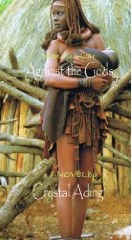 This book recounts the struggles of Wendy Bakari on her journey to womanhood. After a successful stay in the city to obtain her education, a jilted Wendy returns to a fictional African Village called Lufinga where she is forced to confront misogyny, evil spirits, female circumcision and other strange customs. Yet as the granddaughter of the village witch, she must walk a fine line lest she be consumed by her own desires.
This book recounts the struggles of Wendy Bakari on her journey to womanhood. After a successful stay in the city to obtain her education, a jilted Wendy returns to a fictional African Village called Lufinga where she is forced to confront misogyny, evil spirits, female circumcision and other strange customs. Yet as the granddaughter of the village witch, she must walk a fine line lest she be consumed by her own desires.
Category Archives: Miscellaneous
The Flame Trees of Thika: Memories of an African Childhood
 This book is a real literary treasure. I read
This book is a real literary treasure. I read
it first as a teenager. It astonished me then, with its unique portrayal of Africa. Who could fail to love the African wilderness and its diverse
people after reading The Flame Trees of Thika?! Africa seen through Huxley’s youthful eyes is given a magical quality I have never again encountered (though BBC came close to portraying it in their rendition of this book). And it continues to astonish me even now. The spectacular visual imagery from that book are a treasured keepsake, and the book itself is nothing less than a 20th Century masterpiece. It is a priceless gem and well worth the cost.
A literary autobiography set in Kenya during an uncertain
and enterprising colonial era before the First World War, this book is an ideal companion to those interested in the British Empire and African anthropology. For naturalists it
provides breathtaking accounts of white hunters and their quarry as a retrospective commentary on man’s abuse of Africa’s wild heritage. Huxley writes quietly, sensitively and impartially providing philosophic insights in a heuristic and magical narrative. Always compelling, this is an important primary text.
Boys Are Stupid, Throw Rocks at Them!
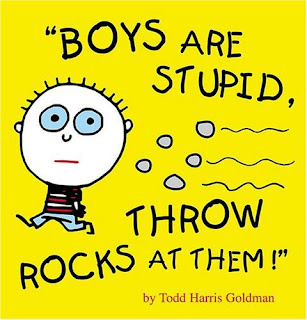
Goldman, Goldman! I don’t think I have a seen a book that has got as many
negative reviews
as this one.
The author does not only manage to offend a really large group of people by his supposedly sexist comments and get himself accused of plagiarism since most of the images in the book are copied from somewhere else, but he also makes the list of the top 100 people who are screwing up America.
And yes, this is actually a real list including people like Jerry Springer and Richard Timmons. And Paris Hilton’s parents,
ha ha
just kidding about the parents.
So anyway, if you do drugstore get offended by sexist comments then this book is definitely a no no. However, if you don’t and you also have a great sense of humor, you might actually enjoy and laugh all through this book. It brings back the child in everyone with the fun illustrations and simplicity.
Just remember, no matter what, do not throw rocks at boys!
Eat, Pray, Love: One Woman’s Search for Everything Across Italy, India and Indonesia
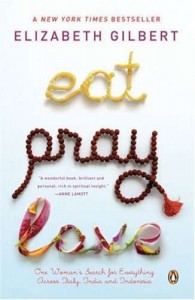 Here is a book that either changed people’s lives or irritated them. Count me among the latter.
Here is a book that either changed people’s lives or irritated them. Count me among the latter.
Eat Pray Love – One Woman’s Search for Everything Across Italy, India and Indonesia by Elizabeth Gilbert was supposed to enlighten me. It didn’t.
OK – First the positive: Overall, it is a well-written book. The author takes many complicated metaphysical concepts and makes them readable. The book is divided into sections: Eat, which is the author’s journey to Italy; Pray, her pilgrimage to India and Love, where she takes a lover in Bali.
This is about a thirty-something woman looking for spirituality and happiness. She is married, but desperately unhappy for no single reason that she cannot or will not divulge. So, she leaves her husband (and, by the way, gives him all marital property out of supposed “guilt” for leaving him, making me wonder what exactly she did to warrant this)and falls right into another relationship (a-ha! adultery, perhaps?). When the rebound relationship that broke up her marriage falls apart, she now wants to find God. Of course. She claims God spoke to her on the bathroom floor, thus beginning her journey.
But not before she goes to her publisher and secures a $200,000 advance for this book. Makes you wonder, as one reviewer on Amazon pointed out, was the journey retrofitted to the book proposal?
What better way to go find God than in Italy. For four months she eats gelato, practices her Italian with a young man named Luca Spaghetti (If you are going to make up names of allegedly real people, could you find a more sterotypical name? Why not Carmine OrganGrinder?) and gains 23 pounds — quick to point out to the readers that she was way underweight to beign with.
She learns to enjoy life and be selfish from the Italians – who by
the way still find her immensely attractive, although they don’t hoot and holler at her like they did 10 years previously. But she is still so damned cute. Just ask her.
On to India. At the Ashram, she learns to meditate and still broods over her lost marriage and subsequent realtionship. Probably the most boring part of the book, except for her conversations with “Richard from Texas” — a down home, larger than life character who speaks in folksy platitudes that would make Andy Griffith proud. He also bestows our author with her nickname “Groceries” because she was emaciated from grief from crying for the millionth time over her beloved David. As one reviewer from Amazon said, “What kind of nickname is Groceries?”
I honestly believe she made these people up. Reminds me of “Go Ask Alice” — supposedly the real story of the drug-addicted Anonymous — until it
was revealed that the protagonist was a fictitious composite of the author’s psychiatric patients. Boo.
Then Bali. She ends her self-imposed celibacy with an older Brazilian man. High on orgasmic ecstasy, out of the supposed goodness of her heart, she asks her
friends to send $18K in donations to help a single mother, an alleged friend of Ms. Gilbert’s, who is portrayed as a con artist because she didn’t buy a house in the timeframe coinciding with the termination of Ms. Gilbert’s visa. I always thought that a gift should be a gift without strings attached — especially coming from someone who supposedly found God. I wanted to ask Ms. Gilbert “What Would Jesus Do?”
My biggest problem with this tome is that this 30-something woman basically is looking for applause for running off for a year, obstensibly supported by a $200K book advance, to “find God.” I’m sure millions of women would love to leave their everyday lives and travel the world to do nothing but self analyze. If she had done volunteer work, I may have felt differently. If she went through some real hardship, I could sympathize. But she was in an incompatible marriage, then dumped by the guy she left her husband for. She should perhaps speak to those battling life-threatening diseases, or raising children alone, or taking care of an elderly parent, or worried about where their next meal is coming from.
And for all of her self-realization and navel-gazing to end her dependence on men, Ms Gilbert has, as pointed out by anotherAmazon reviewer, married her Brazilian and moved to new Jersey. She could have saved Penguin Books a whole lot of money by getting in her car and going through the Lincoln Tunnel. I wonder how long before she ends up back on the bathroom floor.
The Fires
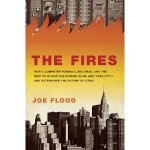 The Fires: viagra online canada pharmacy How a Com
The Fires: viagra online canada pharmacy How a Com
puter Formula, Big Ideas, and the Best of Intentions Burned Down New York City-and Determined the Future of Cities
“It’s comforting to believe that science, technology, and intellectual rigor can solve the world’s ills. In The Fires, Joe Flood pierces that progressive certainty by exhaustively researching a long-forgotten period of New York’s history-when algorithms helped the city’s smartest leaders let the city burn. Flood’s book reads like the best fiction, but is all the more important for its depiction of a real-life metropolitan tragedy.”
-Farhad Manjoo, Slate’s technology columnist and the author of True Enough
“The Fires is a gripping story of human tragedy and intellectual hubris that casts important new light on one
of the most extraordinary episodes in the history of urban living. A cross between The Power Broker and The Wire, The Fires gives us crucial answers to a big question: how do cities fail?”
-Steven Johnson, author of Everything Bad is Good for You and The Ghost Map
“I arrived in the South Bronx as a young firefighter in 1970. The enormity of the devastation was overwhelming. The fact that the city kept burning, despite the dedication of my fellow firefighters, seemed to defy logical explanation. Joe Flood has done an outstanding job making sense out of the chaos, showing the forces that were permanently reshaping New York-starting with the Fire Department-as it headed for the triumphs and tragedies of the 21st century.”
-Thomas Von Essen, Former New York City Fire Commissioner (1996-2002) and author of Strong of Heart
“In a novel, fascinating manner, Joe Flood uses the NYC Fire Department as the anvil on which to hammer out the events between 1965 and 1977 that led to the city’s collapse and changed the way we run big cities. Although already familiar with what occurred-not only did I live through it, but I inherited it when I became Mayor-I was enthralled by Flood’s spectacular and insightful account.”
-Ed Koch, former Mayor of New York City
“In a story that reads like an epic novel, Joe Flood illustrates for us just how our greatest city declined and completely fell apart forty years ago, at the hands of a managing elite who believed they could plan, organize, and control a city by studying computer trends and implementing lofty plans. Our leaders, from Barack Obama to Michael Bloomberg, have much to gain from reading The Fires, and the rest of us have much to lose if we do not read this enlightening and erudite book, for we are on the brink of letting this history repeat itself.”
-Dennis Smith, author of Report from Engine Co. 82 and Report from Ground Zero,
The Girl Who Kicked the Hornet's Nest
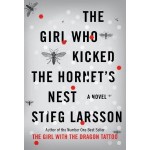
ze-thumbnail wp-image-32″ />Just as Tolkein’s “Lord of the Rings” is held up as the trilogy to which all fantasy trilogies are inevitably compared, I’ve little doubt that Larsson’s Millenium series will play that benchmark role for mystery thrillers over the next few decades.
“The Girl Who Kicked the Hornets’ Nest” is an incredibly worthy successor to the previous two books in the trilogy. And toward the end, there will be moments when tears are brought to your eyes. Larrson knew precisely how to play with timing, rhythm, and wording to pace the story and its ending just right. I’m hard pressed to even guess how else he could have ended this
series.
The story follows the natural conclusion of the events in the first two books as everything dovetails toward a “behind-closed-door” trial. Larrson did a very good job of the first part of this book that takes place in the hospital where Lisbeth is recovering. I really enjoyed reading things from her perspective, then spinning out to others involved and each of their limited pieces of the evolving puzzle. And things just get better as the book moves along.
Frankly, once you hit part three of the book, it’s almost impossible to put down. I picked it up just once…just to read a chapter
or two in the second half of the book…only to find that three
hours had gone by and the book was over.
Larrson’s tying up of many loose ends throughout the book – and this is key – throughout the book (not all in the last few chapters like so many other writers) is masterful. And that emphasizes the one tragic aspect of this final book: knowing that we will never again be graced with Larrson’s storytelling mastery. ;